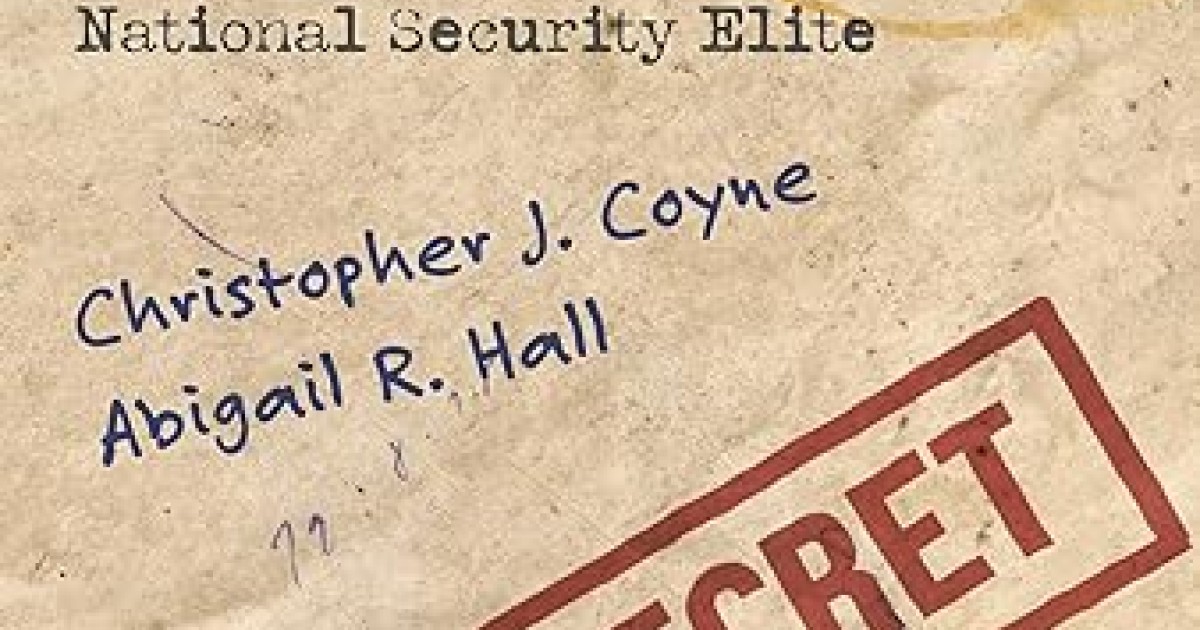Christopher J. Coyne and Abigail R. Hall’s How to Run Wars: a Confidential Playbook for the National Security Elite is a sharp, sardonic critique of America’s perpetual engagement in wars abroad and the erosion of civil liberties at home. The book, newly published by the Independent Institute, masquerades as a guide for the Washington elite, offering a satirical blueprint for maintaining endless conflict and suppressing domestic dissent. Through chapters such as “Control the Narrative,” “Capture the Media,” “Silence Dissent,” “Ignore International Law,” “Sacrifice Liberty in the Name of Liberty,” and “Do Not Accept Failure,” Coyne and Hall dissect over a century of U.S. military interventions, from the Spanish-American War to the ongoing Global War on Terror and involvement in the proxy war with Russia.
In the chapter “Control the Narrative,” Coyne and Hall explore how government and military officials shape public perception to garner support for war. By controlling the narrative, they ensure that the reasons for going to war and the objectives pursued are presented in a favorable light. A poignant example is the Spanish-American War, where the explosion of the USS Maine in Havana Harbor was used to incite public outcry against Spain. Despite ambiguous evidence regarding the cause of the explosion, sensationalist journalism, epitomized by William Randolph Hearst’s newspapers, drummed up support for war, exemplifying how manipulating information can lead to conflict.
“Capture the Media” extends this idea by illustrating how control over media outlets is crucial for sustaining public support for war efforts. During World War I, the Committee on Public Information (CPI), led by George Creel, orchestrated a massive propaganda campaign to rally the American public behind the war effort. The CPI produced films, posters, and pamphlets, and enlisted journalists and speakers to promote pro-war sentiment. This endeavor was not merely about fostering support but also about marginalizing dissenting voices, demonstrating how the media can be co-opted to serve state interests.
In “Silence Dissent,” the authors delve into the methods employed to stifle opposition. The Vietnam War era provides a vivid example, with the government’s response to anti-war protests ranging from surveillance and infiltration by the FBI (under COINTELPRO) to outright violence, as seen in the Kent State shootings. These actions underscore the lengths to which the government will go to suppress any challenge to its war agenda, highlighting the fragile state of civil liberties during times of conflict.
“Ignore International Law” critiques the blatant disregard for international norms and legal frameworks that characterize many U.S. military interventions. The invasion of Iraq in 2003, conducted without United Nations approval and based on contrived claims of weapons of mass destruction, exemplifies this disregard. The subsequent occupation and its fallout further illustrate how international laws and conventions are little more than rhetorical arabesques meant to disguise Washington’s pursuit of strategic objectives, leading to long-term instability and suffering.
“Sacrifice Liberty in the Name of Liberty” tackles the paradoxical justifications for eroding civil liberties domestically while ostensibly promoting freedom abroad. The USA PATRIOT Act, enacted in the wake of the 9/11 attacks, expanded government surveillance capabilities and curtailed individual rights under the guise of national security. This chapter links these measures to a broader pattern of sacrificing fundamental freedoms in the name of protecting them, a theme that resonates through the history of U.S. conflicts.
“Do Not Accept Failure” encapsulates the stubbornness and denial often associated with prolonged military engagements. The Vietnam War is a prime example, where despite mounting casualties and evident futility, successive administrations refused to acknowledge failure. Instead, they escalated the conflict, leading to more devastation and ultimately a humiliating withdrawal. This refusal to accept failure not only prolongs wars but also deepens their human and economic costs.
In conclusion, How to Run Wars: a Confidential Playbook for the National Security Elite is a powerful and provocative critique of U.S. military interventionism. Through its satirical lens, the book bitingly exposes the cynical strategies used to maintain perpetual war and the resulting erosion of civil liberties. Coyne and Hall’s work is an essential read for anyone seeking to understand the dynamics of the national security state and the urgent need for radical reform.








